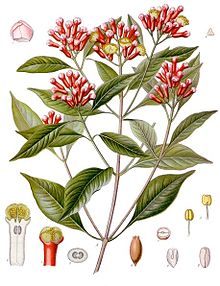
Eugenia caryophyllata

Cloves are the aromatic flower buds of a tree in the family Myrtaceae, Syzygium aromaticum. They are native to the Maluku Islands (or Moluccas) in Indonesia, and are commonly used as a spice. Cloves are available throughout the year due to different harvest seasons in different countries. The clove tree is an evergreen that grows up to 8–12 m tall, with large leaves and crimson flowers grouped in terminal clusters. The flower buds initially have a pale hue, gradually turn green, then transition to a bright red when ready for harvest. Cloves are harvested at 1.5–2.0 cm long, and consist of a long calyx that terminates in four spreading sepals, and four unopened petals that form a small central ball. Cloves are used in the cuisine of Asian, African, and the Near and Middle East countries, lending flavor to meats, curries, and marinades, as well as fruit such as apples, pears or rhubarb. Cloves may be used to give aromatic and flavor qualities to hot beverages, often combined with other ingredients such as lemon and sugar. They are a common element in spice blends such as pumpkin pie spice and speculoos spices. In Mexican cuisine, cloves are best known as clavos de olor, and often accompany cumin and cinnamon. They are also used in Peruvian cuisine, in a wide variety of dishes as carapulcra and arroz con leche. A major component of clove taste is imparted by the chemical eugenol, and the quantity of the spice required is typically small. It pairs well with cinnamon, allspice, vanilla, red wine and basil, as well as onion, citrus peel, star anise, or peppercorns. The spice is used in a type of cigarette called kretek in Indonesia. Clove cigarettes have been smoked throughout Europe, Asia and the United States. Since 2009, clove cigarettes have been classified as cigars in the US. Because of the bioactive chemicals of clove, the spice may be used as an ant repellent. Cloves can be used to make a fragrance pomander when combined with an orange. When given as a gift in Victorian England, such a pomander indicated warmth of feeling.
